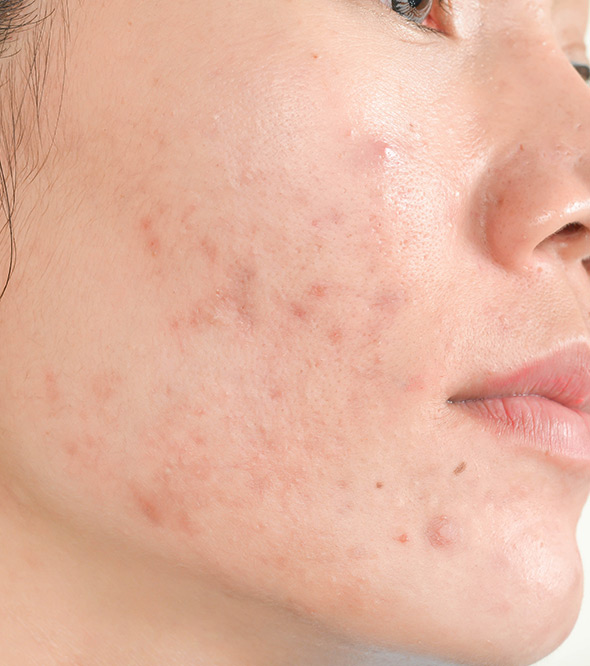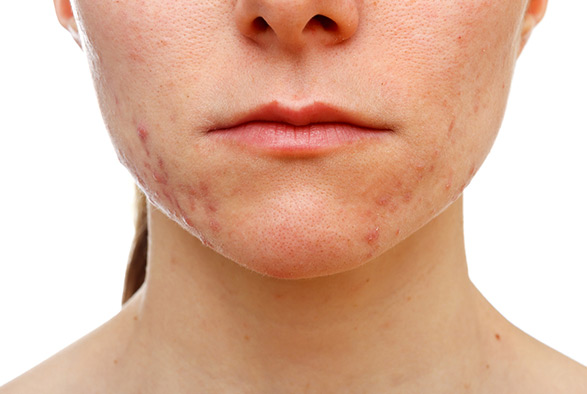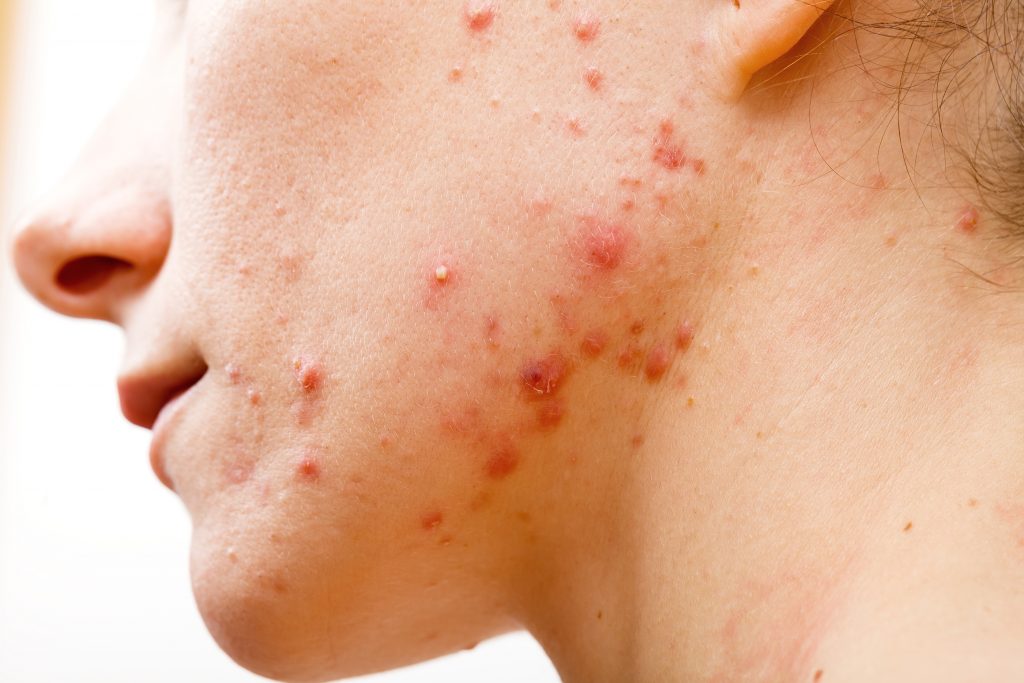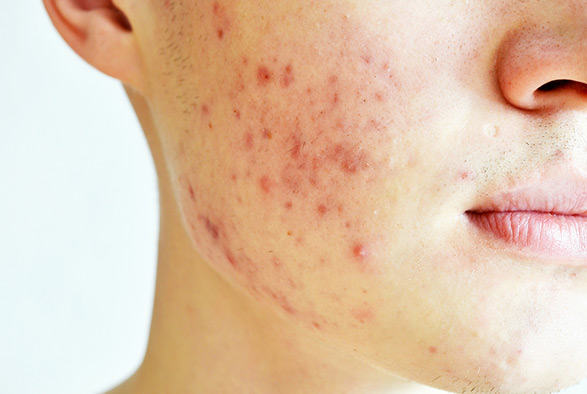Effective Acne Treatment in NY, NJ & CT
Are you or a loved one tired of battling breakouts? Acne can be frustrating and embarrassing, but you don’t have to suffer alone. At Advanced Dermatology, P.C., we understand the challenges of acne and are committed to helping you achieve clear, confident skin.
With a range of effective treatments tailored to your specific skin type and concerns, our experienced dermatologists can develop a personalized plan to address your acne.
Discover how we can help you regain control of your skin and unlock your natural radiance. Contact us directly to learn more, or continue reading below.

What is Acne?
Acne is a common skin condition that affects people of all ages, but it’s particularly prevalent during puberty. It occurs when hair follicles become clogged with oil and dead skin cells, leading to the development of whiteheads, blackheads, and pimples. While often associated with teenagers, acne can persist into adulthood and cause significant distress.
Acne is more than just a superficial skin problem. It’s a chronic inflammation of the hair follicles and oil glands, often resulting in painful and persistent breakouts. Mismanaging acne can lead to scarring, further complicating the condition.
Understanding acne is important for effectively treating and preventing it. By seeking proper care, you can achieve clearer skin and boost your confidence.
Types of Acne
Acne is a complex skin condition with various forms. Here, we outline the most common types.
Non-Inflammatory Acne
- Blackheads: Open pores clogged with oil and dead skin cells.
- Whiteheads: Closed pores filled with oil and dead skin cells.
Inflammatory Acne
- Papules: Small, red, tender bumps caused by inflamed hair follicles.
- Pustules: Papules containing pus.
- Nodules: Large, painful, solid lumps beneath the skin.
- Cysts: Deep, pus-filled lumps that cause significant inflammation and scarring.
Acne Severity
Acne is often categorized based on severity:
- Mild Acne: Primarily blackheads and whiteheads with a few papules and pustules.
- Moderate Acne: Increased number of papules and pustules.
- Severe Acne: Numerous inflamed nodules and cysts.
- Acne Conglobata: A severe form with interconnected nodules and abscesses.
- Acne Mechanica: Acne caused by friction or pressure, often from sports equipment or backpacks.
Cystic acne is a severe form of inflammatory acne characterized by painful, pus-filled cysts that can cause scarring.
Understanding your acne type is essential for developing an effective treatment plan. Our Advanced Dermatology, P.C. dermatologists can accurately diagnose your acne and recommend the best course of action.
What Causes Acne?
Acne is a condition that can be influenced by several factors. While the exact cause isn’t fully understood, several key contributors have been identified, including
- Hormonal factors: Androgens, hormones prevalent during puberty, stimulate increased oil production. Hormonal fluctuations, such as those experienced during menstruation or pregnancy, can trigger acne flare-ups.
- Oil production: Excess sebum (oil) can clog pores, leading to acne.
- Bacteria: Propionibacterium acnes, a bacteria that thrives in oily environments, can contribute to inflammation.
- Dead skin cells: A buildup of dead skin cells can trap oil and bacteria, forming blackheads and whiteheads.


Other factors include:
- Genetics
- Certain medications
- Diet (though the evidence is inconclusive)
- Stress
- Fiction from rubbing the skin.
It’s important to note that while these factors contribute to acne, the specific cause can vary from person to person. If you’re struggling with acne, consulting a dermatologist at Advanced Dermatology, P.C. can help determine the underlying causes and develop an effective treatment plan.
How is Acne Treated?
Acne can be frustrating, but achieving clear skin is possible! At Advanced Dermatology, P.C., we offer a range of dermatological services tailored to your specific acne type and severity, including:
- Over-the-counter topical medications: These can help reduce oil production, unclog pores, and combat bacteria for mild acne.
- Prescription medications: These may be necessary for moderate to severe acne and include antibiotics, retinoids, and other topical medications.
- Acne surgery or corticosteroid injections: Your dermatologist may recommend these for certain types of acne.
- Advanced treatments: We offer laser therapy, chemical peels, microneedling, and dermabrasion to minimize the appearance of acne scars.

Typically caused by bacteria known as Propionibacterium acnes (P. acnes for short), acne causes great distress to those affected and its treatment requires great patience. Researchers are constantly finding and testing new treatment methods; one such method is the virus bacteriophage (phage for short). Can this be another treatment option for acne patients?
One Bacterium, Multiple Uses
Researchers studied the effects of 11 different types of phages on P. acnes. The majority of those phages were successful in killing P. acnes bacteria. Since P. acnes phages can only kill P. acnes bacteria, they may eventually be a useful ingredient in a topical acne therapy. These phages also contain enzymes that break down the cell walls of acne-causing bacteria, another option which may be applied to acne treatments. At this time, the phages are being further researched to determine whether they are indeed a viable acne treatment option.
Other Treatment Options
Think acne and you think “teenager.” Think again: Researchers believe that acnes is present in up to 54% of adult women and in 40% of adult men. The bad news is that half of the affected women don’t respond to traditional therapy, such as benzoyl peroxide, retinoids and antibiotics. The good news is that today’s technological advances have made it possible to dramatically lessen eliminate acne and acne scars using alternative means such as lasers, chemical peels and vitamins.
“For people who can’t or don’t like to take medication or for whom standard treatments don’t work, lasers and peels can produce a very pleasing and long-lasting result,” says Joshua Fox, MD, a leading NY dermatologist and founder of Advanced Dermatology and The Center for Laser and Cosmetic Surgery.
Acne, according to one theory is caused by skin cells that do not shed properly and plug pores, causing oil and bacteria to be trapped inside. As the oil and bacteria accumulates, the skin becomes inflamed and pushes up, forming the dreaded zits and blackheads. The most common type of acne shows up on the face, neck, shoulders, back, and chest.
“Each case is different and patients should discuss the right type of acne intervention for their situation with their dermatologist, ” adds Dr. Fox. “Some considerations to keep in mind when evaluating the options are that laser and chemical treatments are less messy than the daily application of creams and lotions, and unlike oral antibiotics medications, they are non-systemic,” Dr. Fox adds. Following are some of the most popular non-medication acne treatments to consider for acne:
Chemical Peels
A chemical solution is applied to the skin, which strips away dead skin cells. A light peel – which penetrates only the top skin layers — can lessen acne pimples, and decrease the size of large pores. This is done in the dermatologist’s office, and may leave some redness and peeling for a few days.
Laser Therapy
Aura TM Laser targets acne pustules, leaving only mild to moderate redness and swelling that will fade quickly. A prospective clinical study indicates that over 90% of patients treated experience marked reduction in acne lesions.
V-BeamTM or Blue Light, a pulse dye laser, works well with mild to moderate acne. It selectively eliminates the small blood vessels that are associated with the inflammation “redness.” With these vessels gone, the acne is more controlled. After one or two treatments of about fifteen minutes each, patients should see results in a month. Amino levulinic acid (ALA) can be utilized with this laser to maximize results. There is no downtime, only some redness or swelling for 1 day.
VBeamTM treats the bacteria that cause acne, as well as the redness and swelling that often comes along with the condition. Result? Clear, blemish-free skin. Delivering the safety and efficacy of the clinically proven pulsed dye laser, VBeam also minimizes post-operative bruising seen with earlier pulsed dye lasers.
SmoothbeamTM is a new, noninvasive laser treatment that targets and heats collagen in the upper dermis while protecting the epidermis. This laser is the first device specifically designed to target the root cause of acne, the sebaceous gland. With a patented cooling device that makes the procedure relatively discomfort-free, it also safely improves acne scars. A typical treatment will take between ten and thirty minutes, depending on the severity of the case; several treatments may be necessary. There is no downtime.
Fraxel
Quantum IPL ® restores skins youthful appearance through a gentle, nonablative process that applies broad-spectrum lights to sun-damaged skin. It removes age-spots and broken capillaries.
Vitamin – Nicomide ® This new prescription medication is a vitamin which has nicotinamide, zinc, copper and folic acid ingredients which seem to help inflammatory acne. In some patients it may take place of oral antibiotics.
In addition to the treatments listed above, our experienced team can create a personalized treatment plan to address your specific needs and help you achieve clear, confident skin, supported by our before and after acne treatment results.
Frequently Asked Questions
Do you have questions about acne? You’re not alone. Find answers to common questions about causes, treatments, and prevention here.
What is the best way to get rid of acne?
The best way to treat acne depends on its severity. Mild acne can often be managed with over-the-counter products, while moderate to severe acne may require prescription medications or in-office treatments. Consulting a dermatologist is recommended for personalized advice.
Is there anything I can do to prevent acne?
Preventing acne involves gentle skin care, avoiding pore-clogging products, managing stress, and maintaining a balanced diet. However, it’s important to note that acne can be influenced by various factors, and complete prevention may not be possible for everyone.
Can infants get acne?
Yes, infants can develop acne, often due to hormonal imbalances. This temporary condition usually clears up on its own within a few weeks or months. If it persists, consult a pediatrician.
What is Aczone Gel?
Aczone Gel (dapsone) is a prescription acne treatment for individuals aged 12 and older. Applied once or twice daily, it helps reduce acne breakouts by targeting inflammation and bacteria.
What Aczone Gel is?
Acne has held you back long enough, now it’s time to take charge of your life and your skin. We’re excited to offer Allergan’s Aczone Dapsone Gel, 7.5% for individuals aged 12 and older looking forward to a clearer future. The gel is meant to help you maintain a consistent skin care regimen and can be prescribed by your dermatologist after a thorough assessment.

The topical formulation is a once or twice a day treatment which fights acne at its source. Being afflicted with acne may seem like a life sentence, but we have a strategy which makes breakouts seem like a thing of the past. The truth is, acne is preventable and we can reduce your symptoms with the correct treatment plan.
What are acne scars?
Acne scars are permanent indentations or raised areas on the skin caused by past acne breakouts.
What causes acne scars?
Acne scars form when inflamed acne damages the underlying skin tissue, leading to abnormal scar tissue formation.
Can acne scars be treated at home?
While some home remedies may improve overall skin health, treating acne scars typically requires professional treatments.
What methods of treating acne scars can a dermatologist offer me?
Dermatologists offer various acne scar treatments, including laser resurfacing, chemical peels, microneedling, and dermal fillers.
Will treating my acne scars really make a difference?
Yes, treating acne scars can significantly improve your skin’s appearance and boost your confidence.
Why choose Advanced Dermatology?
Advanced Dermatology, P.C. offers comprehensive acne scar treatments tailored to individual needs, with experienced dermatologists providing personalized care and advanced techniques.
